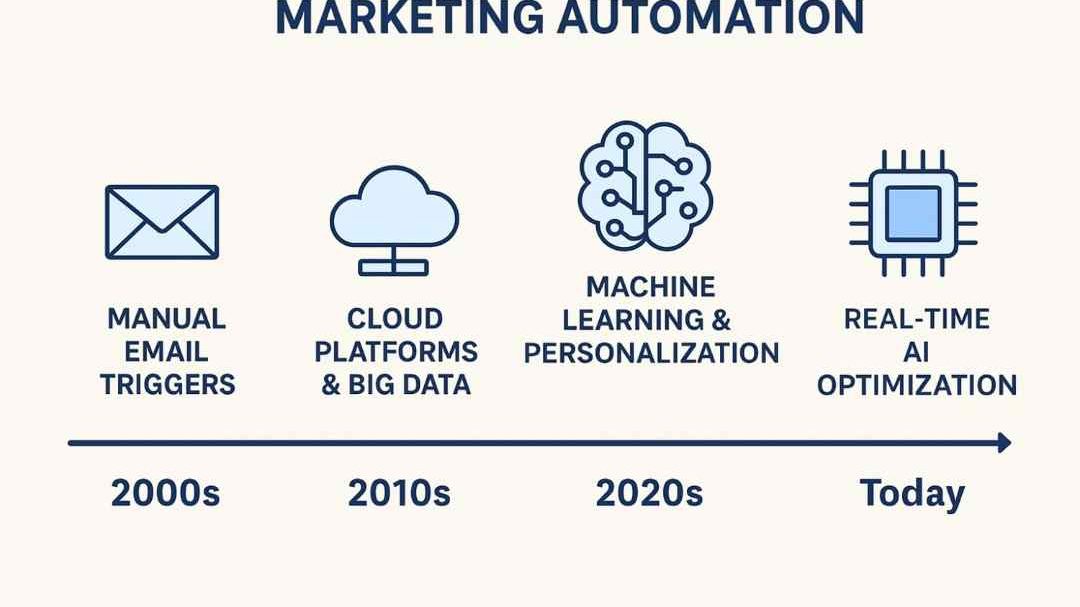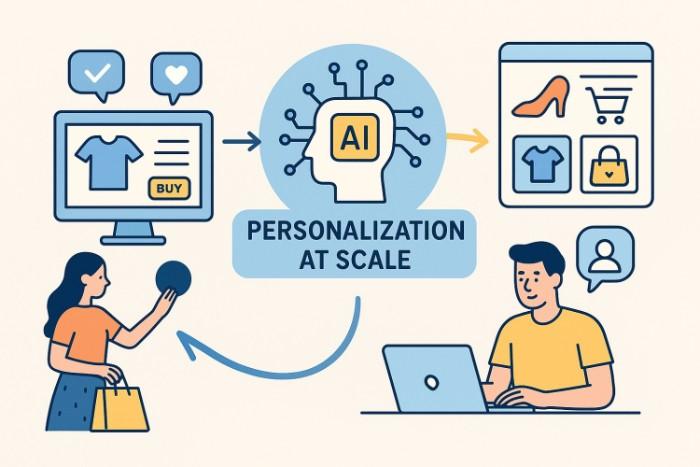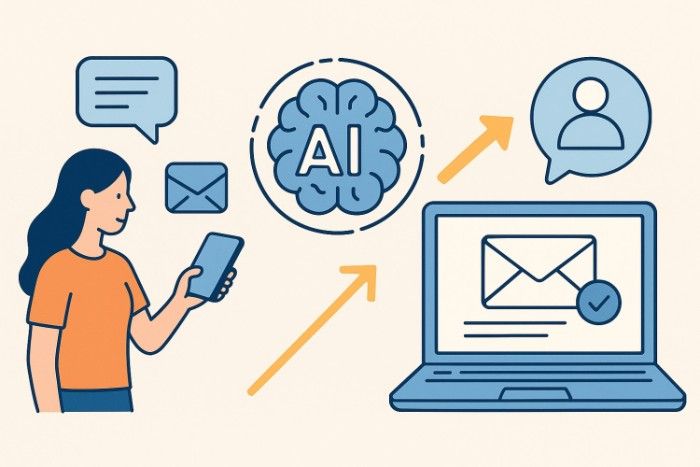The digital retail landscape is changing rapidly thanks to artificial intelligence. E-commerce marketing is now more innovative, more flexible, and stronger. AI helps businesses connect with customers in new ways. According to IBM’s report, technologies like data analytics, natural language processing (NLP), and machine learning are transforming how brands understand and engage with their audiences.
AI in ecommerce lets brands go beyond old rules. It makes marketing more personal and flexible. Now, companies can offer experiences that change based on what customers like and do.
AI can analyze large amounts of data quickly. It finds insights that help make better marketing choices. These innovative systems get better with each interaction, making marketing more effective.
Both small and big online shops can use these advanced tools. They help businesses stay ahead in the fast-changing digital world. By using AI, brands can give customers experiences that are more relevant and engaging.
The future of e-commerce marketing is here. It’s innovative, data-driven, and adapts quickly to meet customer needs.
Table of Contents
- The Evolution of Ecommerce Marketing Automation
- Understanding AI-Powered Marketing Solutions
- Personalization at Scale: AI’s Greatest Gift to Online Retailers
- Predictive Analytics and Customer Lifetime Value
- How AI Enhances Email and SMS Campaign Performance
- Comparing Klaviyo Alternatives for AI-Driven Automation
- Maestra: An AI-Based Marketing Automation Option for Ecommerce
- AI-Powered Customer Segmentation and Targeting
- Chatbots and Conversational Commerce Revolution
- Automated Inventory and Pricing Optimization
- Measuring ROI: The Real Impact of AI on Ecommerce Marketing Automation
- Conclusion
The Evolution of Ecommerce Marketing Automation
The history of marketing automation started with simple email triggers. These changed how businesses talked to customers. In the early days of e-commerce, marketers used basic autoresponders. They sent welcome emails and tracked when customers left their carts.
At first, marketing automation was a manual task. Businesses spent hours sorting customer lists and making email campaigns. The tech was slow, unable to guess what customers wanted or make things personal.
Then, cloud computing and big data changed everything. New platforms could use data from many places, making marketing smarter. Machine learning helped predict what customers might like, making marketing more accurate.
Today, AI in marketing automation does even more. It optimizes campaigns in real time and provides deep insights into customers. It can predict what customers will buy, suggest products, and create unique experiences.
This fast growth in tech lets small e-commerce sites keep up with big ones. They use smart tools that learn and adapt, giving them an edge.

Understanding AI-Powered Marketing Solutions
AI-powered marketing is changing digital commerce. Machine learning algorithms quickly analyze vast amounts of data. This helps businesses understand customers better than ever before.
AI marketing technology lets businesses see how customers behave in new ways. It can predict customer preferences, suggest products, and tailor messages. This means marketers can make campaigns that really speak to their audience.
The power of AI lies in its ability to learn and get better over time. It’s not stuck like old systems. AI can spot complex data patterns and trends, making recommendations that old methods can’t.
AI is also improving online shopping with tools such as natural language processing and computer vision. Chatbots get what you mean, and recommendation engines suggest just what you might like. Predictive analytics help guess what customers will need next.
By using AI, businesses can do more with less and connect with customers in new ways. AI doesn’t replace human creativity. Instead, it boosts what marketing teams can do.
Personalization at Scale: AI’s Greatest Gift to Online Retailers
AI personalization has changed how online stores connect with customers. Modern algorithms can analyze large amounts of data to make marketing more personal. They look at what customers browse, buy, and like to offer content that feels made just for them.
Improving customer experience is more than just showing what they might like. AI can dynamically change website content, emails, and product suggestions. It knows each customer’s path, offering exactly what they need to boost engagement and sales.
AI lets retailers segment customers with great accuracy. It finds small groups within large customer bases, enabling personal experiences without manual effort. This turns generic marketing into a sharp focus on what each customer wants.
With AI, businesses can treat many customers like they’re having a one-on-one chat. It respects privacy while creating exceptional experiences. This builds strong, lasting connections that grow loyalty and help businesses grow over time.

Predictive Analytics and Customer Lifetime Value
Predictive analytics has changed how e-commerce businesses see and use customer lifetime value. It uses advanced machine learning to guess how customers will act. This lets brands predict what customers will buy, who might leave, and how to market to them.
Optimizing customer lifetime value begins with knowing each customer’s path. AI tools analyze past data to predict who will buy again. They also spot signs that customers are leaving early, such as reduced interaction or different browsing habits. This helps brands keep customers by acting fast.
Predictive technology enables marketers to tailor experiences to each customer. It anticipates customers’ needs before they ask, making product suggestions and ads more relevant. This way, businesses can spend their marketing dollars wisely, focusing on customers who will deliver the most value over time.
The true strength of predictive analytics is turning data into practical plans. E-commerce brands can now make data-driven decisions, improving customer interactions, reducing costs, and growing sustainably.
How AI Enhances Email and SMS Campaign Performance
AI is changing how brands communicate with customers via email and SMS. Now, AI can guess the best time to reach out to each person. This makes marketing more personal and effective.
Send-time optimization is a big deal for digital marketers. AI figures out when each customer is most likely to open an email. This means more people engage with messages, leading to better customer interactions.
Campaign optimization uses machine learning to test different approaches. AI tries out various subject lines and content to see what works best. This way, AI helps brands send messages that truly resonate with their audience.
AI tools track customers’ interactions with messages in detail. They learn what customers like by looking at their browsing and buying habits. This lets marketers create marketing that feels just right for each person.
Using AI for email and SMS makes marketing feel more like a chat than a broadcast. Brands that use AI see big boosts in the number of people who open and click their messages. This leads to more sales and revenue.

Comparing Klaviyo Alternatives for AI-Driven Automation
E-commerce businesses are looking for new marketing automation tools. They want something better than Klaviyo. Today, there are advanced e-commerce automation tools that use AI.
When looking for Klaviyo alternatives, focus on AI-driven automation. These tools do more than send emails. They use predictive analytics and create personalized experiences for customers.
To see the leading Klaviyo alternatives, explore platforms like Maestra, ActiveCampaign, and Omnisend. They offer great features, use advanced AI, and work well with popular e-commerce sites. Each one has its own strengths.
When choosing a tool, consider AI, cost, ease of use, and scalability with your business. The best tool for you depends on your needs and goals. These tools help brands create more intelligent, adaptive marketing.
By looking at these alternatives, online stores can improve their marketing. They can engage customers better with AI-powered tools.
Maestra: An AI-Based Marketing Automation Option for Ecommerce
Ecommerce brands are looking for strong Klaviyo alternatives. They want smart marketing solutions. Maestra is an AI-based marketing automation platform designed for ecommerce businesses of various sizes.
Maestra offers AI-based marketing automation features similar to other Klaviyo alternatives, focusing on personalization and predictive analytics.
Small and medium-sized businesses can use AI-driven segmentation tools, such as those on platforms like Maestra, to automatically identify customer groups.
Maestra offers features such as automated campaign optimization and real-time tracking. It also works well with popular ecommerce sites. The AI helps marketing teams focus on strategy while handling complex tasks.
Brands looking for a complete ecommerce automation solution will like Maestra. It has an easy-to-use interface and pricing that grows with your business. Maestra makes advanced marketing tech available to all, helping companies to compete in the digital world.
AI-Powered Customer Segmentation and Targeting
Modern ecommerce marketing has changed a lot with AI. It goes beyond old ways of dividing audiences. Now, machine learning makes segments that change as customers do.
AI looks at complex patterns that people might miss. It finds groups based on how they browse, what they like, and when they buy. This is different from just looking at basic info.
Behavioral segmentation has gotten really smart. AI spots small groups, such as those seeking social proof or sensitive to prices. These groups change as customers do, keeping messages right on target.
The best thing about AI in audience segmentation is the cost savings. It finds the best groups to spend on, making ads more personal. This leads to better sales and happier customers.
Brands that use these innovative methods deliver better experiences. They waste less on ads and connect more with their customers. It’s all about using data to understand and reach people better.
Chatbots and Conversational Commerce Revolution
The world of online shopping is changing fast thanks to conversational AI and virtual shopping assistants. Modern AI chatbots have greatly improved customer interactions. They are now more like talking to a real person than the old, scripted responses.
Conversational commerce is a big deal for online stores. These intelligent virtual helpers give instant, personalized support. They can suggest products, answer questions, and even help with buying things all by themselves.
AI chatbots bring many benefits to online stores. They are always ready to help, can talk to many customers at once, and offer the same quality service every time. They can understand what you mean, figure out what you want, and help you make choices with great accuracy.
By leveraging advanced conversational AI, businesses can make online shopping more fun. Virtual shopping assistants help find the right products, offer style tips, and solve problems without needing a human. This leads to happier customers and more sales.

Automated Inventory and Pricing Optimization
Artificial intelligence is changing how ecommerce businesses work. It uses innovative inventory management and dynamic pricing. AI algorithms analyze large amounts of data to estimate how much of a product to sell.
These tools use past sales, seasons, and trends to keep the right amount of stock. This helps businesses avoid running out or having too much.
AI inventory management is more than just tracking. It changes how often to reorder, where to store products, and which products to promote. It also helps set prices based on what others charge, the customers, and the market.
AI enables businesses to change prices quickly and effectively. They can offer special deals, raise prices during busy periods, and bundle products in clever ways. This way, they can make more money and avoid wasting it on too much stock.
The best thing about AI for inventory and pricing is that it frees up marketing teams. These systems monitor prices and automatically adjust them. This lets marketing teams focus on growing the business rather than just keeping up with prices.
Measuring ROI: The Real Impact of AI on Ecommerce Marketing Automation
Understanding the value of AI in marketing automation requires a detailed look at performance analytics. Businesses must go beyond basic metrics to fully understand the impact on marketing ROI. The value of automation goes beyond just making money. It includes better efficiency, improved customer experience, and long-term strategic benefits.
AI technologies show their power through key marketing metrics. Ecommerce brands often see a 15-25% boost in conversion rates with AI. AI goes beyond simple analytics, giving deep insights into customer behavior and campaign success.
Analytics show the value in many ways. Marketing teams can save 40-50% of time on campaigns. AI also helps increase customer lifetime value through better targeting. Email campaigns can see a 20-30% revenue boost while costs to acquire new customers go down.
Measuring AI’s return needs a complete view. Look at metrics such as revenue per campaign and customer satisfaction scores. Also, consider setup costs, platform fees, and training. AI gets better over time, improving marketing bit by bit.
Innovative ecommerce leaders see AI as a key investment in future marketing. By tracking all performance indicators, businesses can show AI’s real power in marketing automation.
Conclusion
The world of ecommerce marketing is changing fast with AI. Businesses are finding new ways to use marketing automation trends. AI is enabling online stores to connect with customers in new ways.
Ecommerce innovation is about boosting human creativity, not replacing it. The top brands will use AI to analyze data and improve their strategies. In the same way you see trends covered in N8N news about workflow automation, tools like Maestra are making advanced marketing automation available to everyone, removing old barriers.
The future of ecommerce automation is here now. Small to medium-sized businesses can start using AI to get quick results. They can improve customer targeting, optimize email campaigns, and build intelligent chatbots.
As online markets get more competitive, AI marketing automation becomes essential. Companies that use these technologies will build stronger customer ties, grow sustainably, and succeed in the digital world.











